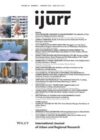This article explores the political dimensions of urban metabolism as a relational urbanization process. We employ a qualitative approach to investigate a case study of material flows between Jakarta and Central Java, Indonesia. That extended space reflects the interconnectedness of city and non-city spaces through material circulations, leading to socio-spatial transformations and the emergence of relational politics. On the one hand, the metabolic circulation of cement from the rural area of North Kendeng (in Central Java Province) to serve as a construction material for infrastructure development in the urban area of North Jakarta engenders a contested space marked by detrimental socio-ecological ramifications at both ends. On the other hand, the solidarity demonstrated by the distribution of rice from North Kendeng to North Jakarta during the Covid-19 pandemic exemplifies political action by inhabitants. This rice distribution constitutes a repoliticization of urban metabolism, contesting both the prevailing logic of capital in governing cement and the conventional rice metabolism. Our study elucidates the spatially stretched relations of politics between inhabitants of city and non-city. It engages with critical urban studies to empirically investigate how marginalized inhabitants extend their political actions against uneven urbanization processes beyond the confines of city spaces.
Details
Written by:
Isnu Putra Pratama, Delik Hudalah, Haryo Winarso, Tim Bunnell
Digital Object Identifier (DOI)
https://doi.org/10.1111/1468-2427.70027
About DOI
